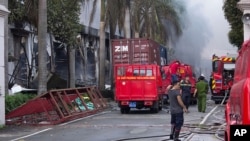Cambodian officials say their country could benefit economically from violent anti-Chinese protests in Vietnam.
Thousands of Chinese have fled Vietnam in the past week, following violent demonstrations by protesters angered by Chinese oil exploration in the contentious South China Sea. Many of those who left Vietnam crossed into Cambodia.
In addition to two deaths and dozens of injuries, the riots damaged dozens of foreign owned factories in Vietnam, including many owned by Chinese businesses.
Ken Ratha, a spokesman for Cambodia's Ministry of Commerce, said the violence may push some Chinese investors towards Cambodia.
“Some Chinese investors are planning to study the possibility to invest more in our country, especially those who already have investment in Vietnam," he said. "They are planning to bring a delegation to discuss trade with us.”
Cheng Hong Bo, a spokesman for the Chinese Embassy, said it is too early to tell.
“Some of them stay here and if there's an end to [the situation] and Vietnam becomes calm, maybe they will return to Vietnam,” he said.
Cambodia’s history is deeply intertwined with both nations and both are major trade partners, while China is a major provider of aid, second only to Japan.
Trade between Cambodia and Vietnam reached $3.43 billion in 2013. Between Cambodia and China, that figure was about $3 billion.
Vietnamese tourists ranked first in 2013, with 850,000 visitors, followed by China at 460,000.
But while investment could increase, Tourism Minister Thong Khon says Phnom Penh is watching to see if tourism from Vietnam drops as a result of the recent problems.
“Tourism from China has not been affected yet, as they travel by air, as do tourists from Vietnam. But we are closely observing whether tourists who transit through Vietnam are declining,” said Thong.
Koy Kuong, a spokesman for the Ministry of Foreign Affairs, said both sides are “friends” and that Cambodia will remain neutral in their dispute.
This report was produced in collaboration with the VOA Khmer service.
Thousands of Chinese have fled Vietnam in the past week, following violent demonstrations by protesters angered by Chinese oil exploration in the contentious South China Sea. Many of those who left Vietnam crossed into Cambodia.
In addition to two deaths and dozens of injuries, the riots damaged dozens of foreign owned factories in Vietnam, including many owned by Chinese businesses.
Ken Ratha, a spokesman for Cambodia's Ministry of Commerce, said the violence may push some Chinese investors towards Cambodia.
“Some Chinese investors are planning to study the possibility to invest more in our country, especially those who already have investment in Vietnam," he said. "They are planning to bring a delegation to discuss trade with us.”
Cheng Hong Bo, a spokesman for the Chinese Embassy, said it is too early to tell.
“Some of them stay here and if there's an end to [the situation] and Vietnam becomes calm, maybe they will return to Vietnam,” he said.
Cambodia’s history is deeply intertwined with both nations and both are major trade partners, while China is a major provider of aid, second only to Japan.
Trade between Cambodia and Vietnam reached $3.43 billion in 2013. Between Cambodia and China, that figure was about $3 billion.
Vietnamese tourists ranked first in 2013, with 850,000 visitors, followed by China at 460,000.
But while investment could increase, Tourism Minister Thong Khon says Phnom Penh is watching to see if tourism from Vietnam drops as a result of the recent problems.
“Tourism from China has not been affected yet, as they travel by air, as do tourists from Vietnam. But we are closely observing whether tourists who transit through Vietnam are declining,” said Thong.
Koy Kuong, a spokesman for the Ministry of Foreign Affairs, said both sides are “friends” and that Cambodia will remain neutral in their dispute.
This report was produced in collaboration with the VOA Khmer service.





